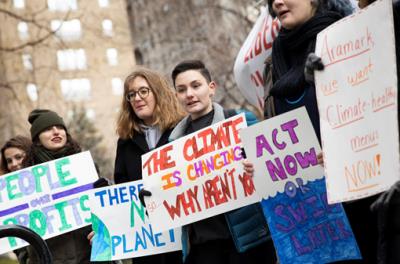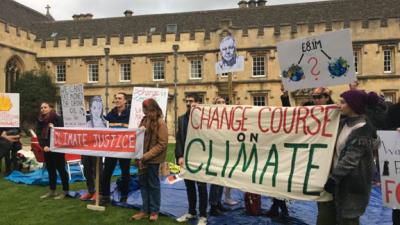 Students from Drexel and Temple Universities in Philadelphia protested at the annual Aramark shareholder meeting this past week. Their action supported opposition mounted by the National Resources Defense Council (NRDC) and other organizations including the Sierra Club, the HSUS and OXFAM.
Students from Drexel and Temple Universities in Philadelphia protested at the annual Aramark shareholder meeting this past week. Their action supported opposition mounted by the National Resources Defense Council (NRDC) and other organizations including the Sierra Club, the HSUS and OXFAM.
At issue is the requested commitment from Aramark to reduce meat servings in meals served at universities and institutions, and to substitute environmentally friendly vegetable-based protein. The organizers of the protest demanded a 20 percent reduction in carbon dioxide emissions from production of red meat, dairy and other foods served by Aramark.
In coming months, the NRDC will be working with campus organizations to pressure dining services to respond to the challenge of climate change.In past years, Aramark was responsive to demands for enhanced welfare with special emphasis on eggs derived from caged hens. Aramark as a major supplier to universities, institutions and corporate dining complied with student requests although the cost associated with welfare demands increased the cost of meals. This was conveniently passed on to parents and added to student loans.

Protest at St John's College Oxford |
In an interesting perspective on student confrontation over environmental action was illustrated by the protest at St. John’s College, Oxford. As reported in an editorial in The Wall Street Journal on Monday February 3rd the Bursar (financial executive) of the College, Andrew Parker was presented with a demand by students that the College divest more than $10 million in oil-company shares. He responded with a counter-offer to turn off the gas heating system, given that the student activists were so concerned over fossil-derived energy. He counseled “It is all too easy to demand that others do things that carry no personal cost to yourselves. The question is whether you and others are prepared to make personal sacrifices to achieve the goals of environmental improvement”.
|